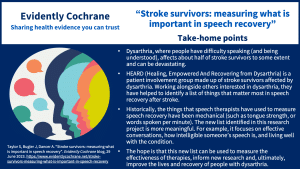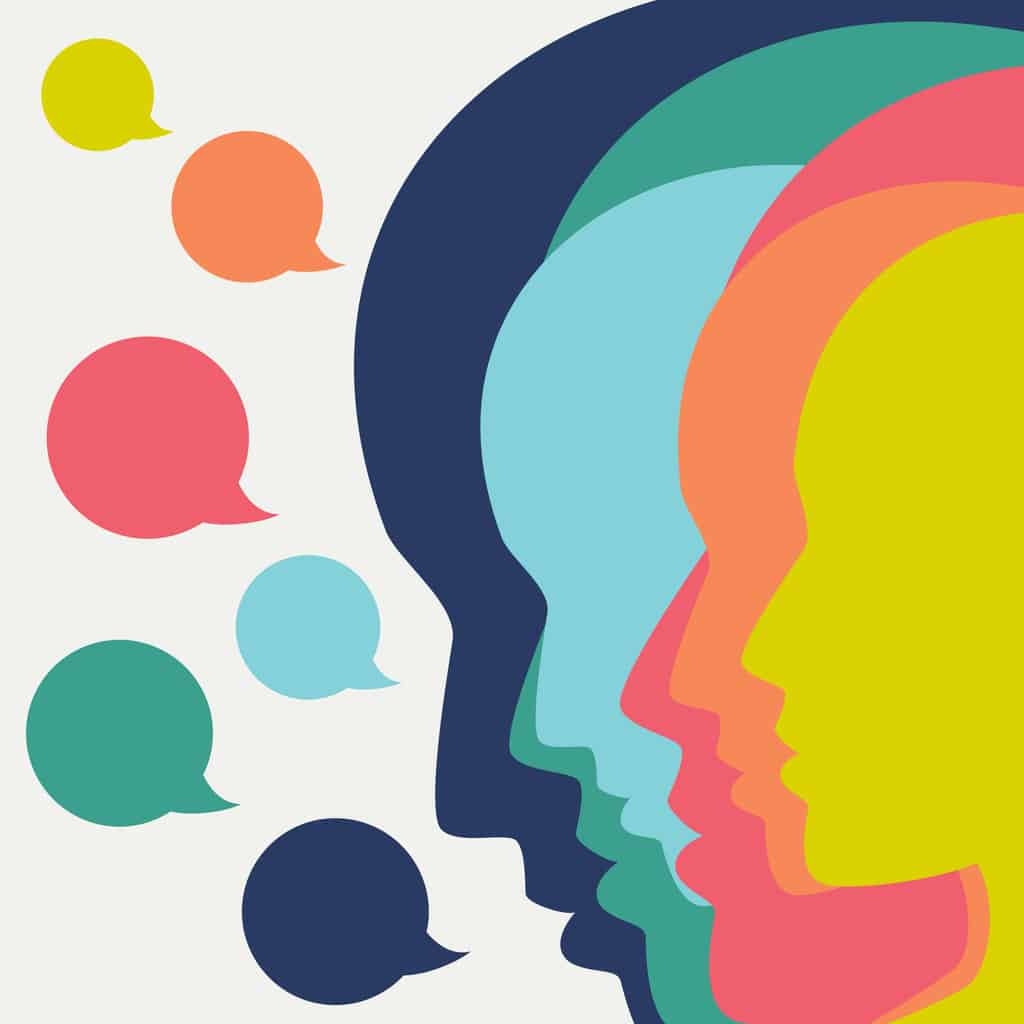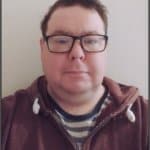Stephen Taylor, Joe Bugler, and Annette Dancer are three stroke survivors affected by dysarthria (unclear speech). They are also members of HEARD (Healing, Empowered And Recovering from Dysarthria), a patient involvement group which has helped to shape research to identify the things that matter most in speech recovery after stroke. In this blog, they tell us more.
Take-home points

People get involved in research projects for all sorts of reasons following a stroke. New therapies, new diets, and new drugs, all promising to make recovery a little faster, relapse a little less likely, and mostly to make life easier for future stroke survivors.
The HEARD (Healing, Empowered And Recovering from Dysarthria) group was a little different. Meeting initially via Zoom in the midst of Covid lockdowns, three stroke survivors were recruited by University of Manchester lecturer and research fellow for the Stroke Association, Claire Mitchell. Among the many battle scars that stroke had left, the three members of HEARD had been affected by dysarthria; where you have difficulty speaking (and being understood) because the muscles used for speech are weak or uncoordinated. Dysarthria is the more mechanical, straightforward, and more common form of speech disability that often happens following a stroke, and gets less therapeutic attention than aphasia, where language is affected.
The impact of dysarthria
Dysarthria affects about half of stroke survivors to some extent and can be devastating. The voice is such a personal and intimate thing; automatic and reliable. Your first words almost certainly predate your first memories. When that voice suddenly changes, a crucial part of your self-image changes with it. The timing of a joke is off, a private whisper turns into an embarrassing bark, your voice dwindles to nothing during a call to the bank manager. You probably don’t realise how twinned your voice and your personality are.
The HEARD project: measuring what matters most in dysarthria recovery
The HEARD research project wasn’t to lessen the effect or help live with the symptoms of dysarthria. It was to establish a set of what researchers call ‘Core Outcomes’; measurable markers of what is important to people about their speech and its potential improvement. Historically the scores that speech therapists used to gauge speech recovery have been mechanical. Tongue strength, words per minute, lip shape, volume and so on. The aim of this project was to come up with a Core Outcome set which would be more useful and meaningful for people affected by dysarthria.
The three stroke survivors, Annette, Joe, and Stephen were recruited to offer first-hand insight into what felt important to recovery. Alongside a host of visiting students, academic speakers and temporary group members, the HEARD group created a long (LONG!) list of factors that could prove important to everyone involved – stroke survivors, researchers, and speech and language therapists. After much debate, many cups of tea, one animated video and a smart new webpage, the full list was compiled and launched as an online questionnaire.
The questionnaire was sent to a larger group of British and Australian stroke survivors, researchers, and speech therapists (or speech pathologists) and each question was rated in terms of importance. The whole exercise was repeated a couple of months later with the added ability to see how the vote went previously, and adjust if needed.
The result is a much-shortened list of outcomesOutcomes are measures of health (for example quality of life, pain, blood sugar levels) that can be used to assess the effectiveness and safety of a treatment or other intervention (for example a drug, surgery, or exercise). In research, the outcomes considered most important are ‘primary outcomes’ and those considered less important are ‘secondary outcomes’., agreed in two online meetings, as the most important and most measurable markers along the path of recovery for people with dysarthria. The list, in stark contrast to the mechanical measures of old, focuses on effective conversations, how intelligible someone’s speech is, living well with the condition, and finding and training good communication partners.
The hope is that this more meaningful Core Outcome set will be used to measure the effectivenessThe ability of an intervention (for example a drug, surgery, or exercise) to produce a desired effect, such as reduce symptoms. of new and existing therapies, as well as informing new research, hopefully improving the lives and the recovery of people with dysarthria.
If you think this all sounds interesting and would like to get involved or hear more, please contact the researcher we have been working with Dr Claire Mitchell Claire.mitchell@manchester.ac.uk. We always want to hear from stroke survivors living with dysarthria.
Further information and support about dysarthria
- Sorry, what did you say? Living with dysarthria (unclear speech) after stroke. In this blog, Annette shares her story of living with dysarthria after stroke and Claire Mitchell explains the Cochrane evidenceCochrane Reviews are systematic reviews. In systematic reviews we search for and summarize studies that answer a specific research question (e.g. is paracetamol effective and safe for treating back pain?). The studies are identified, assessed, and summarized by using a systematic and predefined approach. They inform recommendations for healthcare and research. on treatmentSomething done with the aim of improving health or relieving suffering. For example, medicines, surgery, psychological and physical therapies, diet and exercise changes. for dysarthria after stroke.
- Read more about Dysarthria (difficulty speaking) on the NHS website.
- The Stroke Association have communication tools on their website to support people who have difficulties communicating.
This project is funded by the National Institute for Health and Care Research (NIHR) under its Research for Patient Benefit (RfPB) Programme (Grant Reference Number NIHR202748) and by the Stroke AssociationA relationship between two characteristics, such that as one changes, the other changes in a predictable way. For example, statistics demonstrate that there is an association between smoking and lung cancer. In a positive association, one quantity increases as the other one increases (as with smoking and lung cancer). In a negative association, an increase in one quantity corresponds to a decrease in the other. Association does not necessarily mean that one thing causes the other. (SA_PDF_21\100017). The views expressed are those of the author(s)and not necessarily those of the NIHR, the Department of Health and Social Care or the Stroke Association.
Stephen’s biography appears below. Read Joe’s biography and Annette’s biography.
You can join in the conversation on Twitter with Joe (@bugler_joe), Annette (@francefold), Claire (@ReaDySpeech), @TheStrokeAssoc and @CochraneUK or leave a comment on the blog.
Please note, we cannot give specific medical advice and do not publish comments that link to individual pages requesting donations or to commercial sites, or appear to endorse commercial products. We welcome diverse views and encourage discussion but we ask that comments are respectful and reserve the right to not publish any we consider offensive. Cochrane UK does not fact-check – or endorse – readers’ comments, including any treatments mentioned.



Thanks for a very interesting, clearly explained, article!
Such important work! It’s really interesting to hear how this work came about; thanks for sharing!